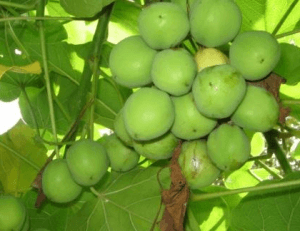Ghana widens scope for biofuels after Jatropha and sugarcane
 Ghana has been keen in looking at cultivating the non-food crop Jatropha to produce biofuel. A number of foreign companies have acquired very large tracts of land and are growing Jatropha to produce biodiesel in the country.
Ghana has been keen in looking at cultivating the non-food crop Jatropha to produce biofuel. A number of foreign companies have acquired very large tracts of land and are growing Jatropha to produce biodiesel in the country.
Gold Star Farms, a Ghanaian company, claims it has about five million acres of land available to grow Jatropha for biodiesel production.
One Norwegian company, Scanfuel has acquired 400,000 hectares of land in the Asante-Akim North District of the Ashanti region and is cultivating Jatropha for the production of biodiesel for export.
Other foreign companies have also acquired land to grow sugarcane for the production of ethanol.
In December 2009, the vice president of Ghana, John Mahama announced that large tracts of land will be acquired in the Northern region to grow sugarcane for the production of ethanol for export. A Brazilian company is reported to be involved with this project.
The country however, is widening the scope to include other renewable sources of energy.
Last week, the GNA reported that the Council for Scientific and Industrial Research (CSIR), acting in partnership with the Energy Technology Research Group of the Southampton University, United Kinge GNdom (UK), has commenced research into the use of modern technologies to develop biofuel in Ghana.
The Minister of Environment, Science and Technology, Ms. Sherry Ayittey, was quoted as saying at a workshop to discuss the subject that this is to help promote energy diversification and security in sub-Saharan Africa and reduce dependence on crude oil in the long-term.
The workshop was attended by the academia, scientists, technologists, industry, and policy makers from Ghana, Asia and Europe.
Topics they treated included “second generation biofuels based on biomass pyrolysis technology”, “computational modelling of biomass fast pyrolysis” and “micro-algae as biomass for energy conversion, scope and possibilities.”
The Minister said initial research and development activities in the country focused on the use of food and energy crops as feedstock for the biofuel industry.
However, it has been established that the use of these feedstock for energy could compromise the nation’s food security and this could have socio-economic and environmental implications.
Ms Ayittey said given the abundance of various types of agricultural residues, including maize and rice straw, husks, millet and sorghum straw, the nation stands a better chance of achieving a breakthrough in developing a comprehensive cost-effective and environmentally friendly biofuel.
The ongoing research, she said, would take into consideration pyrolysis technique application – the thermo-chemical process that converts organic materials into usable fuels.
By Emmanuel K. Dogbevi

It is true that business has a very good prospect
It is a very good idea,but i also want to set up a sugar factory in the northern region and i need your help